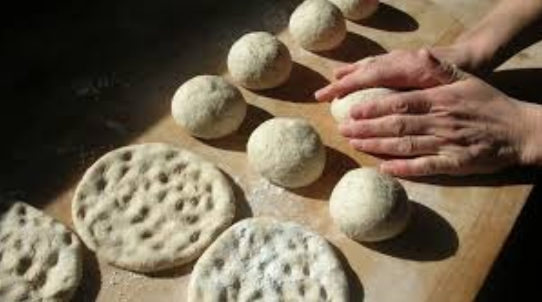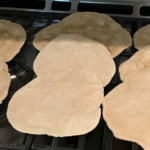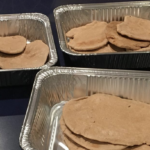
Yes, Ashkenazi Jews Can Eat Soft Matzah On Pesach
 Rabbi Dr. Shlomo Pill is a senior lecturer at Emory Law School, and senior fellow and associate director of law and Judaism at Emory’s Center for the Study of Law and Religion, where his work focuses on Jewish and Islamic law, religious liberty, and U.S. law for clergy and religious organizations. He also bakes his own soft matzah for Pesach, which he explains is perfectly halachically permissible for Ashkenazi Jews to eat.
Rabbi Dr. Shlomo Pill is a senior lecturer at Emory Law School, and senior fellow and associate director of law and Judaism at Emory’s Center for the Study of Law and Religion, where his work focuses on Jewish and Islamic law, religious liberty, and U.S. law for clergy and religious organizations. He also bakes his own soft matzah for Pesach, which he explains is perfectly halachically permissible for Ashkenazi Jews to eat.
Pill explains, “I’ve always been pretty into food and cooking and I’m also very much into not outsourcing my Judaism to the extent that I can.” Therefore baking his own matzah was a compelling idea for him. An Iraqi Jewish neighbor of his invited him to join him in baking matzah at his house. “I had never really thought about doing something like that, but he’s a scrupulously observant guy and had been doing this for a long time. This is how his family baked matzah.” Pill baked with him for a number of years. When the neighbor eventually made aliyah, Pill took over the baking group and has been doing it ever since.
For most people, baking their own soft matzah is a novel idea and one that would require research and getting used to an idea which would otherwise seem so foreign to them. For Pill, it was the same. “The Torah says to eat matzah on the first night of Pesach. It doesn’t really say what it should look like or feel like or taste like.” With this as with many other things, our traditions help inform us as to what to do.
 In researching the text and the history of matzah creation, Pill discovered that once you’ve put flour and water together, 1500 years of halachic discussions explore how to minimize the risk of making chametz. Soft matzah still meets the halachic requirements of what can be still called matzah. “Once upon a time, thicker, even soft matzahs were normal, even in the ashkenazi world.” It was only relatively recently that Ashkenazim trended towards a more crunchy, cracker-like matzah. “As long as it’s done right, there’s no problem, at least from a chametz perspective.” Rav Asher Weiss has said that while he doesn’t think there are any issues with this from a standpoint of Jewish law, it isn’t traditional, which causes Rav Weiss to be less favorable about the idea. “I think there’s something important to that… The experiential aspects of Pesach, as a family tradition, the way we run a seder, the family tradition is so valuable.” For Pill, this is what makes the seder “a tool for transmitting this critical aspect of Jewish identity and tradition.” In contrast, Rav Herschel Schachter has no issue with soft matzah in conjunction with other parts of the seder being more traditional.
In researching the text and the history of matzah creation, Pill discovered that once you’ve put flour and water together, 1500 years of halachic discussions explore how to minimize the risk of making chametz. Soft matzah still meets the halachic requirements of what can be still called matzah. “Once upon a time, thicker, even soft matzahs were normal, even in the ashkenazi world.” It was only relatively recently that Ashkenazim trended towards a more crunchy, cracker-like matzah. “As long as it’s done right, there’s no problem, at least from a chametz perspective.” Rav Asher Weiss has said that while he doesn’t think there are any issues with this from a standpoint of Jewish law, it isn’t traditional, which causes Rav Weiss to be less favorable about the idea. “I think there’s something important to that… The experiential aspects of Pesach, as a family tradition, the way we run a seder, the family tradition is so valuable.” For Pill, this is what makes the seder “a tool for transmitting this critical aspect of Jewish identity and tradition.” In contrast, Rav Herschel Schachter has no issue with soft matzah in conjunction with other parts of the seder being more traditional.
Pill believes that “there’s an experiential value in baking your own matzah. We outsource a lot of Judaism and a lot of our observance.” Baking his own provides Pill with this connection. With this, he bakes his matzah at a lower temperature of 500 degrees for 5 minutes, as opposed to traditional matzah, which is baked on 1000 for 30 seconds. He is very careful to make sure he doesn’t knead his dough outside in the sun, which is a stringency that Ashkanazai Jews took on. He keeps it in the oven until it is fully baked and doesn’t let it finish baking outside of the oven. “There are a variety of particularities that go into the Ashkenazi baking practices, that have nothing to do with hard or soft or thick and thin. I bake Ashkenazi matzah, that’s soft.” When baking at home in a non-industrial setting, it takes much more thought and care to conform to all these Ashkenazi practices.
Contrary to what one would think on seeing these photos, soft matzah does not taste like laffa bread, which often has salt, oil added to it. According to Pill, it still tastes delicious, but is much closer to hard matzah than bread. Because it doesn’t keep for long, soft matzah hasn’t caught on in the world of Passover consumer packaged goods. If kept in the freezer, it will last. “It makes fantastic matzah pizza.” While Pill wouldn’t recommend doing it at home unless a person is trained by someone who knows how to do it, he has people make it with him so that they can learn the process. “Mess-ups are easy as well. You can end up with matzah that isn’t baked and you could have it on Pesach and that’s not good.” Pill also sources flour in a special way as regular flour is considered chametz. “[While] I’ve never considered it as a business venture…usually people do join [me] and get the experience of doing it.”
To contact Rabbi Pill, find him on Facebook or email shlomopill@gmail.com.
If you found this content meaningful and want to help further our mission through our Keter, Makom, and Tikun branches, please consider becoming a Change Maker today.







